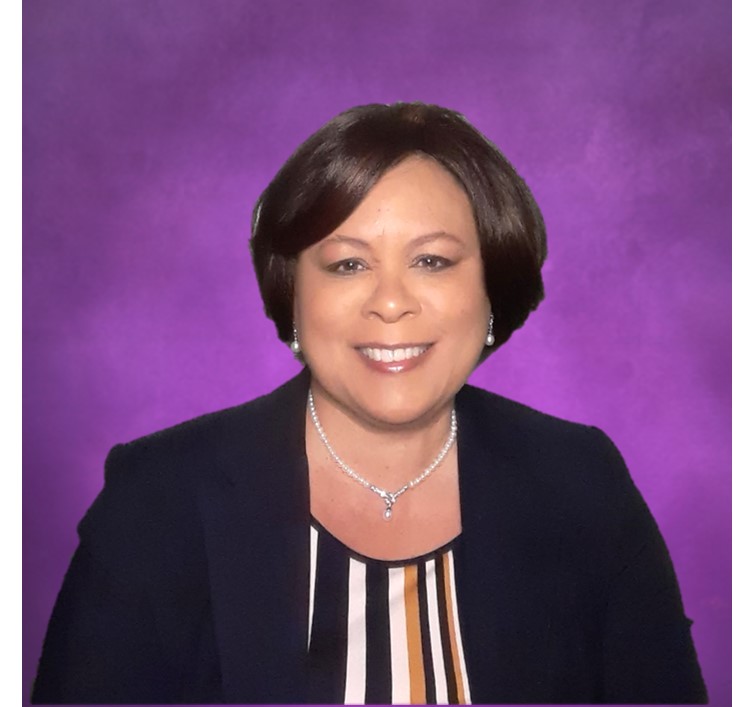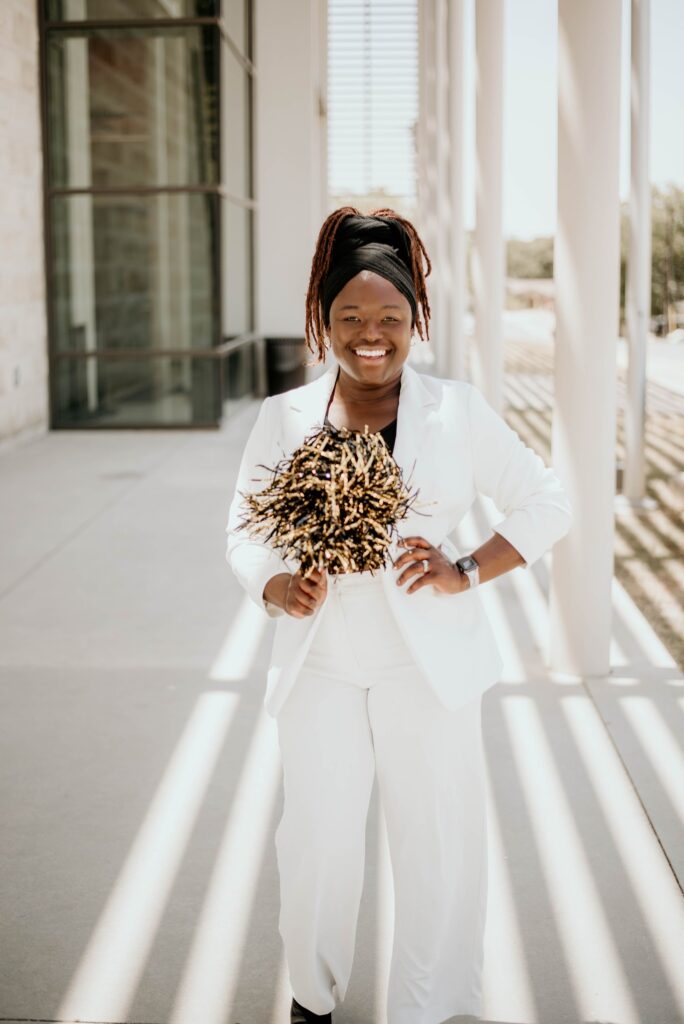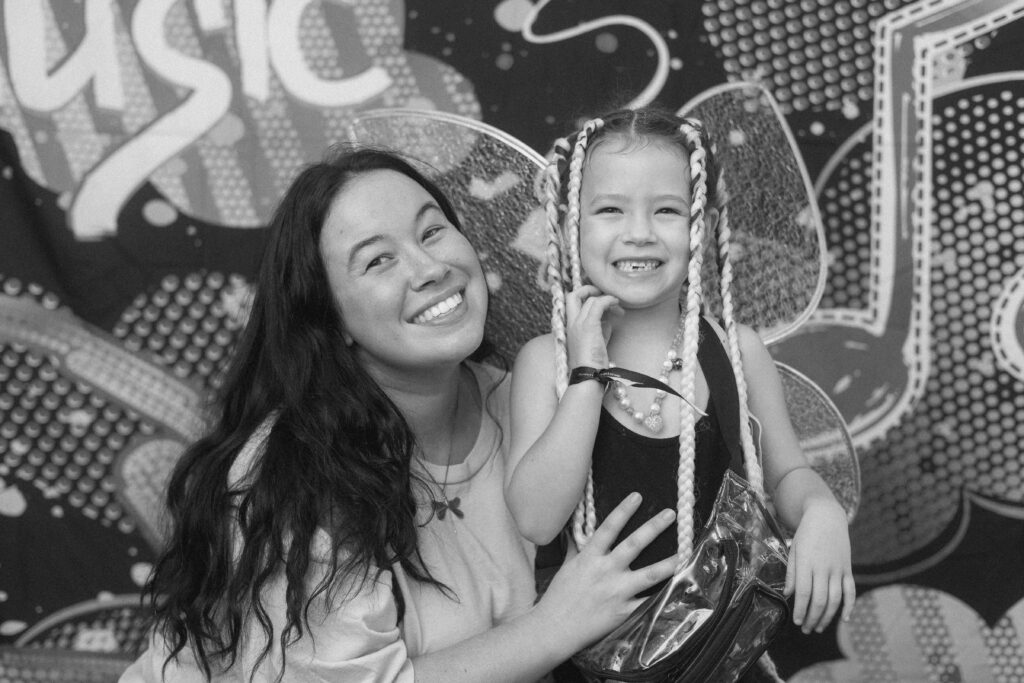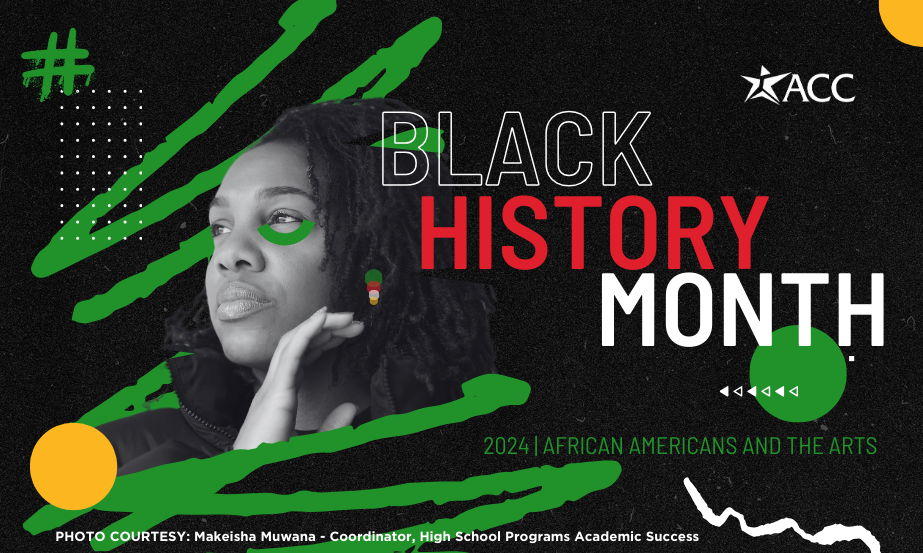Throughout February, Austin Community College District (ACC) asks influential and accomplished faculty, staff, and students to discuss Black History Month and this year’s theme.
Kathy James
Kathy James (she/her) is the executive dean of advising and affinity programs.

What are some personal or professional accomplishments you are most proud of?
- After entering into several master’s degree programs over an extended period of years, I finally completed my M.A. in Higher Education Leadership from Sam Houston State University in December 2020. I’m calling it my “Pandemic Degree.”
- Provost’s 3Cs Shining Star Award recipient, April 2023.
- I appreciate the trust and confidence leadership had for me to become the inaugural director of advising, then the executive dean of advising and affinity programs.
- Participated in the Civitas Next Generation Leadership Academy, 2019.
- My team and I have built a nationally recognized Academic Guidance Training Model and Advising Career Ladder, which we have presented at NACADA, TEXAAN, and many virtual meetings with other colleges and universities.
- I am a member of Delta Sigma Theta Sorority Inc.
- Prior to coming to ACC, I served many years in Division I college athletics.
- While a track coach at the University of Texas, my team won the 1990 NCAA Indoor National Championship. We were among top five programs in the nation and won multiple Southwest Conference Championships during my four years of coaching.
- From 1991 to 1998, I was the National Event Coordinator for USA Track & Field for the Women’s Long & Triple Jumps, along with many athletic accolades.
- I’ve been married to my husband, Bartel, for 33 years, and we have a beautiful accomplished adult daughter, Elaina, and 15-year-old grandson, LeDaniel “LJ,” who happens to be 6’4”! Yes, he is a baller!
Why do you believe it’s important for the college to commemorate Black History Month? How do you honor the month?
ACC should commemorate Black History Month because our premiere campus is built on hallowed grounds. Many remember and refer to Highland Campus as a former popular shopping mall. Before the city acquired the land to build a mall, this was the St. John’s Orphan Home and Industrial Institute. It served to meet the needs of displaced Black boys and girls and educate Black children. This was a solution to segregation, discrimination, and educational inequity suffered by Black people at the time, and the discrepancies are still evident today. I don’t know if people notice the historical chronology shown on the wall in Building 1000 or the placards in the breezeway between Buildings 2000 and 3000. Daily, we walk along a historical pilgrimage that is part of Black history, specifically Austin’s Black history. There is greater access, but the struggle for Black education is still real, as evident in the persistence and completion rate of Black students right here at ACC.
This year ACC is exploring how the arts shaped Black culture. What does this theme mean to you? Why is it important?
Art and entertainment are prominent and pivotal in Black culture. It remains a primary avenue for the freedom of self-expression with limited suppression. We are less censored. Black art is a unifying genre among many cultures. Take rap, for example. Country and western music artists have fully embraced what was known as a controversial form of expression. Black dance movement is the epitome of understanding rhythm, soul, and sensuality. Who doesn’t attempt to do the electric slide!
Chelsa King-Carr
Chelsa King-Carr (she/her) is the manager of the college’s BRASS, ACC’s Bold Representation of Achievement through Student Support, program — formerly known as the Black Representation of Achievement through Student Support program. She started at ACC in September 2019.

What are some personal or professional accomplishments you are most proud of?
I am in my second term serving on the board of directors for the alumni association at my undergrad. I am the youngest person and the first Black female to serve on that board. The highlight of my service has been starting and building out the Black alumni connection supporting the university’s Black alum and the current student body.
Why do you believe it’s important for the college to commemorate Black History Month? How do you honor the month?
Commemorating Black History Month supports the cultivation of our college’s culture that acknowledges, respects, and values the impact of Black individuals and communities in our country. By doing so, all students — regardless of their background — have access to historical information, which promotes a more accurate understanding of Black history. Our community also uses this month to reflect on issues of racial justice, equity, and the ongoing struggle for civil rights, empowering them to contribute positively to society.
As the manager of BRASS, I honor Black History Month by organizing and supporting a series of educational and cultural events that highlight the achievements and experiences of Black Americans. I work with faculty and staff members at ACC to integrate culturally relevant experiences and education in our courses and programming throughout the year. It’s important to me that celebrating Black excellence is not confined to just one month but is a continual part of our educational journey.
This year ACC is exploring how the arts shaped Black culture. What does this theme mean to you? Why is it important?
To me, this theme is a celebration of the multifaceted ways in which Black artistic expression has contributed to the cultural fabric of both the United States and the world. The arts are where we shine in the Black community — Black people are so creative. From music and dance to culinary and fashion, there is so much depth and passion behind all the forms of expression. Most of these artistic origins are rooted in strife, and our ancestors’ ability to pull beauty from pain is why we are such resilient people. Art serves as a powerful avenue for storytelling and understanding of the dynamics of identity and expression.
Tell us about one artist who you feel has had a strong influence on Black culture.
Nikki Giovanni is an influential figure in the Black Arts Movement. She is a celebrated poet, activist, and a member of the same sorority as me, Delta Sigma Theta Sorority Inc.
If you could have dinner with any Black artist, living or dead, who would it be, and why?
Oh, I would have to talk to Basquiat! His art and collaborations are so interesting to me. 27 is a very young age to depart from the earth. I would ask about his inspirations, aspirations, and how he landed on his style and creative process.
How do you stay connected to your roots?
I stay connected to my roots by going home as often as possible. I grew up in a very small rural town in Arkansas, where I spent most of my time as a kid standing in chairs in the kitchen helping the adults cook or outside barefoot and exploring my grandparents’ land. I speak to my grandmother weekly, often about faith, family, and food — the Holy Trinity! She never measured anything in any recipe, so my cousins and I have spent the better half of our adult lives huddled around her at Thanksgiving and Christmas watching her techniques, still failing to make our food taste like hers.
What resources do you recommend for anyone interested in learning more about Black artists and/or culture?
Visit art galleries and museums locally or when traveling. They often have amazing installations and activations. Bookstores also host events with authors, and those spaces support and foster creativity.
What inspires you?
I’m inspired by people who are not afraid to be their authentic selves. Those people are the happiest, and you can see and feel it. We live in such a “trendy” society that the greatness that is individuality often gets misappropriated as being weird or not accepted by the majority.
Ayeesha Green
Ayeesha Green is the coordinator of the college’s Student Money Management Office. The office supports student success by providing accessible and relevant money management education, enabling students to make informed financial decisions.

What are some personal or professional accomplishments you are most proud of?
I am proud to have played an instrumental role in building the Student Money Management Office (SMMO) into an award-winning and nationally recognized office. SMMO is a leader in community college student financial education, offering research-informed programming that has benefited thousands of our students and earned recognition from The Texas Higher Education Coordinating Board and the Association for Financial Counseling and Planning Education.
An accomplishment that has given me the most satisfaction is developing and launching the Gaining Momentum Program (GMP), a project to address the pressing issue of the racial wealth gap affecting our Black students. In response to alarming predictions outlined in a 2017 report by the Institute for Policy Studies, we strategically positioned the GMP to educate our students on the potential eradication of the median household wealth of Black Americans by 2053. The program features a powerful racial wealth gap forum. It serves as a catalyst, inspiring participants to explore our shared history and motivating them toward a pathway to financial empowerment and asset accumulation.
Participants have the opportunity to learn essential skills such as managing their finances, leveraging retirement accounts, paying down debt, and improving credit. To further enhance their financial journey, each participant receives $500 upon completion to be directed toward a debt repayment, credit-building, or asset accumulation plan. This financial incentive marks a significant step toward the personal financial empowerment of our Black students.
The success stories stemming from the GMP are truly heartening. A remarkable 85% of participants either graduate or enroll within 6-12 months post-program, and 71% exhibit improved financial well-being scores within just six months. Beyond mere statistics, these figures symbolize our intentional efforts to foster a safe and brave learning environment for participants. The design and commitment behind Gaining Momentum seamlessly align with the core principles of the theory of change championed by our Chancellor, Dr. Lowery-Hart.
On a personal note, becoming an Accredited Financial Counselor has been a journey of growth. It’s not just a professional accreditation; it’s a testament to my commitment to providing even more robust financial wellness support to the students I serve.
Why do you believe it’s important for the college to commemorate Black History Month? How do you honor the month?
Black history is an integral part of the American narrative, offering ACC a pivotal moment during Black History Month to explicitly recognize the profound contributions of Black Americans. Our experiences, unique and distinctive, are marked by remarkable achievements — countless inventions often overlooked — and enduring struggles, from slavery to the challenges of Jim Crow, redlining, and mass incarceration.
I remember a saying from our family elders: “Efforts to erase a people from their history are akin to removing the roots from a tree.” We’ve already felt the initial separation from our history. And although we’ve made tremendous progress since then, we cannot allow erasure or history to repeat itself. For me, honoring Black history extends beyond a designated month; it is a constant presence in my life — a year-round acknowledgment of resilience, strength, and the enduring contributions of Black Americans. It is imperative for ACC, as an institution of higher learning, to remain vigilant in preserving the many aspects of Black history.
This year ACC is exploring how the arts shaped Black culture. What does this theme mean to you? Why is it important?
This theme holds significant importance as it provides an opportunity to acknowledge and celebrate the contributions of Black artists. Through music, literature, and visual arts, we get to say who we are unapologetically. And despite what seems as insurmountable challenges, we have enriched the entire world with our creativity. Born in the 70s in Flint, Michigan, I personally find immense joy in our music. From the soulful messages of Marvin Gaye’s “What’s Going On” to the empowering lyrics of James Brown’s “Say it Loud — I’m Black and I’m Proud,” and the familial melodies of the O’Jays. These weren’t merely sounds filling our home and family cookouts — they were affirmations of cultural pride, moments of reflection, and sources of healing.
If you could have dinner with any Black artist, living or dead, who would it be, and why?
I really like this question. Staying in the realm of music, given the chance, and I’m going to be bold, my ideal dinner companion would undoubtedly be Ermias Joseph Asghedom, better known as Nipsey Hussle — especially fitting as we recently celebrated 50 years of hip hop. Making it a family affair, I’d invite my two sons. They initially introduced me to the impact of Nipsey’s music. As a runner, I deeply resonate with his metaphorical emphasis on the “Marathon” as a journey mirroring life’s endurance.
What struck me about Nipsey’s life was that he transcended being merely a rapper from Los Angeles cut down in his prime. He was brilliant and championed causes beyond his personal interests, demonstrating a commitment to economic empowerment through his “Vector 90” initiative in the Crenshaw District. It became a beacon of hope, offering crucial resources such as coworking spaces and a STEM center for underserved youth.
Nipsey’s forward-thinking extended to the tech-savvy integration of augmented reality (AR) technology (the first of its kind) at The Marathon Clothing store. The immersive experience, particularly in the clothing tags, revealed his dedication to innovation and personalized engagement with supporters.
Then, his “Proud to Pay” campaign left an enduring mark as he positioned himself as an independent industry disruptor. Selling 1,000 physical copies of his Crenshaw album directly to consumers for $100, he achieved a sellout within 24 hours and subsequently released the project online for free. In addition to challenging the antiquated record labels and their predatory 360 deals, this bold move resonated deeply, inspiring his dedicated listeners. It seamlessly aligns with the broader historical context where Black artists have often fought for autonomy and equitable recognition.
Without a doubt, my ideal cookout guest, whether living or deceased, would be the late Nipsey Hussle.
Kelsey Londos
Kelsey Londos (she/her) is an ACC Paralegal and Interdisciplinary Studies: African and African Diaspora student. She started at the college in August 2023.

What are some personal or professional accomplishments you are most proud of?
I spoke in 2018 to a panel of neonatal intensive care unit (NICU) healthcare workers at St. David’s Central Austin. Then again in 2020 to an audience of one million NICU parents during the COVID-19 pandemic. It was really healing to challenge my fears about taking up space and to share my truth about preeclampsia and traumatic birth experiences in order to help others.
Why do you believe it’s important for the college to commemorate Black History Month? How do you honor the month?
In the U.S., approximately 40% of women who experience preeclampsia are Black or Brown. It’s important for colleges to commemorate Black History Month to honor diverse heritages and experiences. From a mixed-race perspective, I believe it promotes unity and understanding among different racial pools, and celebrates the deep waters of cultural contributions from all communities.
Storytelling with my daughter is one way I honor the month and pass down the spirit of my ancestors.
This year ACC is exploring how the arts shaped Black culture. What does this theme mean to you? Why is it important?
Art has been a powerful tool for storytelling, resistance, and empowerment, making space for Black voices to be heard and celebrated. By exploring the influence of the arts on Black culture, we honor the resilience, creativity, and diversity blooming across the Black diaspora.
OPTIONAL: Tell us about one artist who you feel has had a strong influence on Black culture.
TaKiyah Wallace (founder of Brown Girls Do Ballet) so beautifully captures Black and Brown softness in her photo project. Her organization is a celebration of dancers of color, and a trove of resources. She promotes diversity in the arts by providing annual scholarships, a mentor network, and community programs to empower young girls.
OPTIONAL: How do you stay connected to your roots?
Through Ancestry.com I found books about my 5th great-grandparents, Josephine Wilson and Blanche Kelso Bruce, and their dynasty (“Black Fortunes,” “From Slave to Senator,” and “The Senator and the Socialite” to name a few). I love to read, so finding whole books to connect with them and hear their life stories gave me butterflies!
OPTIONAL: What resources do you recommend for anyone interested in learning more about Black artists and/or culture?
NPR’s Black Austin Matters is a podcast that highlights the Black community and Black culture in Central Texas.
Mariama Mbacke
Meet Mariama Mbacke, an ACC student since fall 2022 and a member of the Bold Representation of Achievement through Student Support (BRASS). Mariama is majoring in Business Administration and intends to specialize in human resources. She expects to graduate in summer 2024.

What does Black History Month mean to you?
Black History Month, although I believe that Black history is American history, is an opportunity for me to highlight my intersectionality, being that I am a Black woman in America, and educating people on the different treatments that may oftentimes occur due to that same intersectionality. It is also a month when I like to learn about unsung heroes in the fight for civil rights.
How do you celebrate Black History Month?
Besides going around and greeting my fellow Black comrades like “Happy Black People Month!” with a huge smile that follows and a warm greeting from beautiful Black souls, I have also taken it upon myself to hold a Black history session for an hour with my coworkers every Thursday throughout the month. I am teaching them about microaggressions in the workplace and emphasize leaving racist notions of “professionalism” that stem from white supremacy behind.
What accomplishments are you most proud of?
The accomplishments I am most proud of consist of many things, but if I had to choose, the student-led events that I have conducted here at ACC as a Riverbat ambassador. ACC’s Student Life department has offered me the opportunity to create a space for students and to promote holistic growth through events and resources. Most importantly, doing all of this while being my authentic self.
What is a significant moment you had in your life or at ACC?
A significant moment at ACC would have to be being recognized by Black women in different positions here. I have many mentors, most of whom are Black women, and I cherish the lessons and the recognition that come from these women. It has had an impact on my growth. They share their experiences and journeys they’ve ventured, and that is significant in its own right.
What does ACC do that empowers your ethnicity?
ACC’s BRASS program has implemented so many things that promote success in black students, and that has empowered my ethnicity.
What would you tell someone looking to start college?
I would tell them to get familiar with the resources that exist. Learning what is available to you and when to use it is crucial during your first two years of college. Lastly, get involved.

